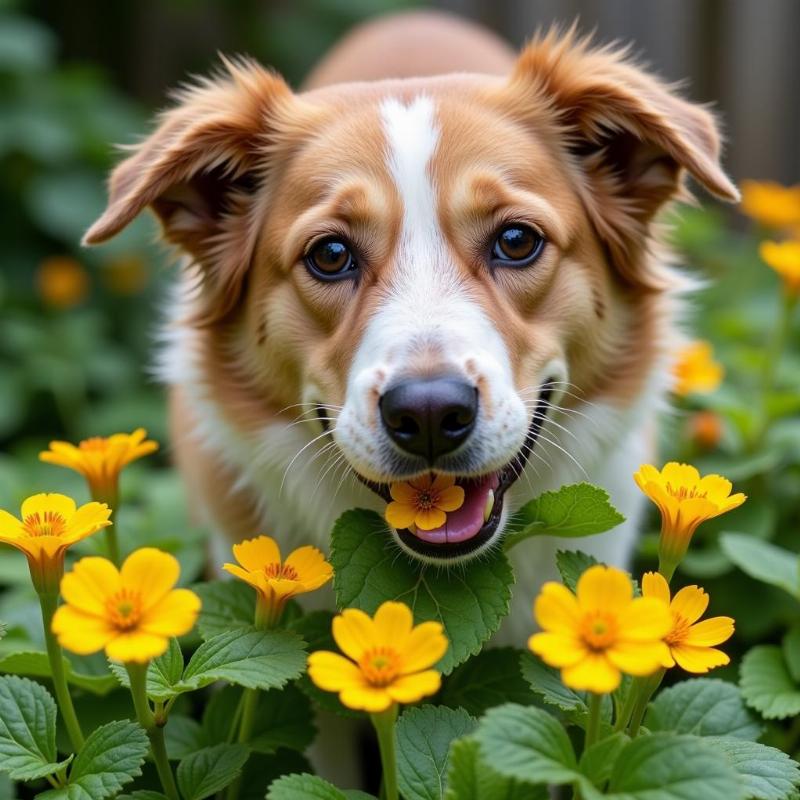Nasturtiums are beautiful, edible flowers that add a splash of color to any garden. But if you’re a dog owner, you might be wondering, are nasturtiums poisonous to dogs? The good news is that nasturtiums are generally considered non-toxic to dogs. However, while they aren’t likely to cause serious harm, consuming a large quantity can lead to mild gastrointestinal upset. Let’s delve deeper into this topic to ensure your furry friend stays safe and healthy.
Nasturtiums and Canine Safety: A Detailed Look
While nasturtiums are non-toxic, it’s crucial to understand that “non-toxic” doesn’t equate to “no potential issues.” Ingesting any plant material in large amounts can cause digestive upset in dogs, including vomiting and diarrhea. Think of it this way: even too much of a good thing can be bad. Nasturtiums contain isothiocyanates, which are the compounds responsible for their peppery taste and aroma. These compounds can irritate a dog’s stomach if ingested in large quantities.
What to Do if Your Dog Eats Nasturtiums
If your dog nibbles on a few nasturtium flowers or leaves, don’t panic. Monitor them for any signs of discomfort, such as vomiting, diarrhea, or loss of appetite. Most likely, they’ll be perfectly fine. However, if your dog consumes a large quantity of nasturtiums and exhibits persistent or severe gastrointestinal symptoms, it’s essential to contact your veterinarian immediately.
 Dog eating nasturtiums in a garden.
Dog eating nasturtiums in a garden.
Preventing Nasturtium Consumption in Dogs
The best way to avoid any potential problems is to prevent your dog from accessing nasturtiums in the first place. Consider planting them in raised beds or hanging baskets, out of your dog’s reach. Training your dog to “leave it” can also be incredibly helpful in keeping them away from these and other potentially problematic plants. Positive reinforcement training, using treats and praise, can teach your dog to avoid certain areas of the garden.
Safe Gardening Practices for Dog Owners
Creating a dog-friendly garden involves more than just avoiding toxic plants. It’s also about choosing safe fertilizers and pesticides. Look for products specifically labeled as pet-safe. Avoid using cocoa mulch, as it can be toxic to dogs. Opt for pet-friendly alternatives like shredded bark or pine straw.
Conclusion
So, are nasturtiums poisonous to dogs? No, they are not considered toxic. However, moderation is key. While a few nibbles are unlikely to cause harm, excessive consumption can lead to mild digestive upset. By taking preventative measures and understanding the potential effects, you can ensure your dog enjoys a safe and healthy environment, even with nasturtiums gracing your garden.
FAQ
-
What are the signs of plant poisoning in dogs? Symptoms can vary but often include vomiting, diarrhea, loss of appetite, lethargy, and excessive drooling.
-
Are all parts of the nasturtium plant non-toxic? Yes, all parts of the nasturtium, including flowers, leaves, and seeds, are generally considered non-toxic to dogs.
-
What should I do if my dog eats a large amount of nasturtiums? Contact your veterinarian immediately.
-
How can I make my garden safer for my dog? Choose pet-safe fertilizers and pesticides, avoid using cocoa mulch, and consider fencing off areas with potentially problematic plants.
-
What are some other dog-friendly plants? Sunflowers, zinnias, and snapdragons are just a few examples of flowers that are safe for dogs.
Beautdogs.us is your premier online resource for all things dog-related in the USA. From breed information and grooming tips to expert advice on pet care and the latest product reviews, we’re dedicated to providing comprehensive and reliable information for both new and experienced dog owners. We offer expert guidance on breed selection, nutrition, training, and overall wellness to ensure your canine companion thrives. Discover a wealth of valuable resources and connect with a community of passionate dog lovers. Contact us today for personalized advice and support! Email: [email protected] Phone: +1 501-555-7529. Visit Beautdogs.us, your trusted partner in canine care.